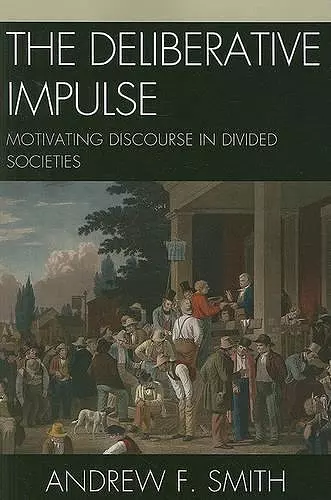The Deliberative Impulse
Motivating Discourse in Divided Societies
Format:Paperback
Publisher:Lexington Books
Published:22nd Feb '11
Currently unavailable, and unfortunately no date known when it will be back
This paperback is available in another edition too:
- Hardback£92.00(9780739146095)

What can motivate citizens in divided societies to engage in free, open, and reasoned dialogue? Attempts by philosophers to answer this question focus largely on elucidating what citizens owe to one another as free and equal citizens, as members of a shared social context, or as agents who are mutually dependent on one another for our well-being. In The Deliberative Impulse: Motivating Discourse in Divided Societies, Andrew F. Smith suggests that that a better answer can be offered in terms of what we owe to our convictions. Given the defining role they play in how we live our lives and regard ourselves, among the highest-order interests that we maintain is being in a position to do right by our convictions—to abide by conscience. By developing a clear understanding of how best to act on this interest, we see that we are well served by engaging in public deliberation. Particularly for citizens in societies that are fragmented along ethnic, cultural, ideological, and religious lines, our interest in abiding by conscience should give us clear moral, epistemic, and religious incentives to deliberatively engage with allies and adversaries alike. Scholars who focus on issues in political philosophy, ethics, and political theory will value this book for how it suggests we can overcome the motivational roadblocks to active political participation and robust deliberation.
Andrew Smith offers a propitious new way to think about the meaning and importance of living according to conscience. His book speaks to people's deepest convictions, extending an uplifting case in favor of more and better deliberation among divided citizens in pluralistic societies. -- Lucas Swaine, Dartmouth College
Deliberative democrats have won the day among democratic theorists. But it is not clear that deliberative democracy can succeed among democratic citizens, especially in light of the fact that many deliberative views require citizens to deliberate with their political opponents. Hence there is a serious practical concern about deliberative democracy: How can citizens be encouraged to deliberate together, despite their substantive moral and political differences? In this engaging book, Andrew Smith takes up this practical challenge. Drawing on an attractive conception of conscience, Smith makes a case for thinking that our fundamental desire to live in accordance with our deep convictions provides us with a compelling incentive to publicly deliberate. This book makes an important contribution to the theory and practice of deliberative democracy. -- Robert B. Talisse
In this highly original book, Smith asks an important question that remains in the background for most theories of deliberative democracy. It is the question of genuine inclusion: how is it that that those who are disenfranchized can come to see themselves as full participants? -- James Bohman, Saint Louis University
ISBN: 9780739146101
Dimensions: 234mm x 156mm x 12mm
Weight: 308g
190 pages